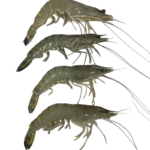The aquaculture landscape in India is witnessing a remarkable resurgence of the Black Tiger Shrimp (Penaeus monodon), a species once overshadowed by the dominance of vannamei shrimp. This resurgence is not just a stroke of nostalgia but a strategic shift driven by market demands, ecological considerations, and advancements in farming techniques.
Historical context
Traditionally, the Black Tiger Shrimp, known for its robust flavor and larger size, was the cornerstone of India’s shrimp industry. However, the early 2000s saw a gradual shift towards vannamei shrimp, primarily due to their higher yield and disease resistance. Despite this, the Black Tiger Shrimp has maintained a niche market, particularly among consumers who prefer its taste and texture.
Reasons for the resurgence
Market diversification:
With the global shrimp market increasingly saturated with vannamei shrimp, Indian exporters are turning to Black Tiger Shrimp to differentiate their offerings. This shrimp variety commands a premium price in international markets, particularly in Japan and Europe, where it is highly valued for sushi and other delicacies.
Sustainability and ecological balance:
Black Tiger Shrimp are more adaptable to diverse ecological conditions, including brackish water. Their farming is seen as more environmentally sustainable compared to intensive vannamei farming, which often requires significant chemical and feed inputs.
Advancements in farming practices:
Innovations in selective breeding, disease management, and feed efficiency have made Black Tiger Shrimp farming more viable and profitable. Enhanced farming techniques have also mitigated previous challenges like susceptibility to disease and slower growth rates.
Government initiatives:
The Indian government, recognizing the potential of Black Tiger Shrimp, has been supportive, providing subsidies and technical assistance to farmers. This support is aimed at revitalizing traditional shrimp farming regions and encouraging sustainable practices.
Current trends and developments
The Indian states of Kerala, West Bengal, Andhra Pradesh and Gujarat, traditionally known for Black Tiger Shrimp farming, are leading this resurgence. Farmers in other coastal states are also adopting Black Tiger Shrimp, encouraged by its higher market value and sustainability. Research institutes in India are actively engaged in developing disease-resistant and high-yield varieties to further boost this sector.
Market potential and challenges
While the market potential for Black Tiger Shrimp is significant, challenges such as maintaining consistent quality, scaling up sustainable farming practices, and competing with established vannamei markets remain. Additionally, the need for rigorous quality control and certification to meet international standards is critical for market expansion.
Conclusion
The rising trend of Black Tiger Shrimp in India is not only a sign of diversification in aquaculture but also a strategic move in response to shifting global market demands. We strongly believe that the Black Tiger Shrimp has the potential to significantly increase sales in Europe, following the patterns observed in China, where its popularity is already on the rise. As we approach the latter part of the year, a general decrease in shrimp prices is anticipated, making Black Tiger Shrimp even more appealing to cost-conscious consumers seeking premium quality. Furthermore, with India achieving a record production of Black Tiger shrimp in 2023, and with final numbers expected to be significantly higher than in 2022, we can expect a corresponding decrease in prices, enhancing the competitiveness of Black Tiger Shrimp in the international market. This resurgence marks an exciting phase for India’s shrimp industry, offering a blend of traditional practices and modern market dynamics, potentially revolutionizing shrimp trade patterns in the coming years.
Discover our products:

BLACK TIGER HOSO 40/50 to 70/80 BOX 800g Premium HOSO Black Tiger Shrimp in 800g Box from India Exquisite and […]
See Our products